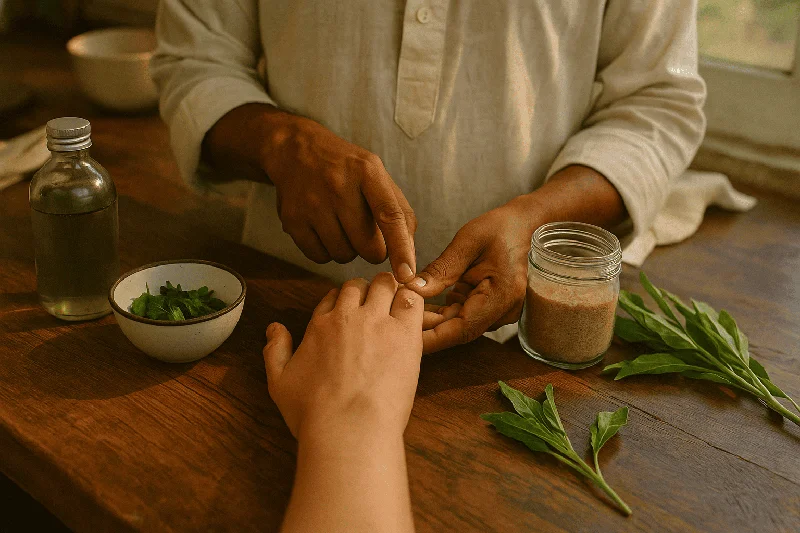Ask Ayurvedic doctor a question and get a consultation online on the problem of your concern in a free or paid mode. More than 2,000 experienced doctors work and wait for your questions on our site and help users to solve their health problems every day.
What is Treatment of Warts in Ayurveda?

Warts are a prevalent skin condition that can affect people of all ages. These benign skin growths are primarily caused by the Human papillomavirus (HPV), a highly contagious virus. HPV has multiple strains, and different strains are responsible for various types of warts. Warts often appear on the skin’s top layer, manifesting as raised, rough, and sometimes painful growths. They can differ in appearance and size depending on their location and the specific strain of HPV involved.
The treatment of warts in Ayurveda is seen as more than just a skin issue. They are considered a manifestation of an underlying imbalance in the body’s doshas, with particular attention given to the vitiation of the Kapha and Vata doshas. Ayurveda takes a holistic approach to address both the root cause of the condition and the removal of warts themselves. Here are some key components of Ayurvedic wart treatment:
Dietary Modifications:
During wart treatment, Ayurvedic diet recommendations strive to balance the doshas, reducing foods that exacerbate Kapha dosha. This often involves minimizing the consumption of dairy products, sweets, and heavy, oily foods. Whereas Ayurveda encourages the consumption of foods with pungent, bitter, and astringent tastes, such as ginger, turmeric, and leafy greens. These tastes help restore balance and support the body’s natural healing processes. They also help in building a healthy diet that boosts the overall immunity and strength of the body.
Don't wait or self medicate. Start chat with Doctor NOW
Ayurvedic Treatments:
Topical herbs or oils are commonly used in Ayurvedic acne treatment. Chemicals and products used include:
Neem: Neem oil or paste is known for its antibacterial and antibacterial properties, making it effective in treating acne.
Turmeric: Turmeric powder has antibacterial properties and can be used to reduce acne.
Triphala: A combination of 3 fruits – amla, haritaki, and bibhitaki is a blood cleanser and helps in getting rid of toxins due to its laxative.
Other herbs like Manjishtha, Sariva, Guggulu, Nimba, patola, etc are also used in the management of warts.
Detoxification and Panchakarma:
Panchakarma, a set of Ayurvedic detoxification therapies, is often recommended to purify the body and eliminate toxins. These therapies may include oil massages, herbal steam treatments, and purgation. By detoxifying the body, Panchakarma supports the immune system’s ability to combat the virus responsible for warts.
Agnikarma helps in cauterizing small warts instantly. It is a great option as most it will not cause recurrence of warts in that particular location.
Lifestyle changes:
Good hygiene practices are important to prevent the spread of warts to other parts of the body or other people. Regular physical activity is encouraged to improve circulation and overall health and boost the immune system. Stress management techniques, including yoga, meditation, and relaxation exercises, help reduce stress. Stress can weaken the immune system, making it harder for the body to cure warts.
Ayurvedic wart treatment is characterized by its holistic approach, extending beyond the mere removal of warts to delve into the root causes that lead to their development. It acknowledges that warts are not merely superficial growths but rather indicators of an underlying imbalance within the body’s doshas, with a particular focus on the vitiation of the Kapha and Vata doshas. This holistic philosophy in Ayurveda underscores the importance of addressing not only the symptoms but also the core issues that contribute to the formation of warts.
The effectiveness of Ayurvedic wart treatment can vary from one individual to another, depending on factors such as the type and size of warts, overall health, and individual constitution. To ensure a safe and comprehensive treatment plan, it is highly recommended to seek guidance from an Ayurvedic practitioner especially if warts persist, cause discomfort, or give rise to concerns about their appearance or possible complications. This collaborative approach combines the wisdom of Ayurveda with conventional medical expertise, ultimately offering a well-rounded strategy for wart management.
Ayurveda, with its emphasis on natural remedies, dietary adjustments, lifestyle modifications, and personalized care, not only aims to remove warts but also seeks to restore balance, promote overall health, and enhance one’s overall sense of well-being. It embodies a holistic and integrated approach to health, treating not just the symptoms but the individual as a whole.
Ask-Ayurveda– Best Ayurvedic Treatment Providing Platform
Ask-Ayurveda is a platform that helps connect patients with experts through Ayurveda online consultation in order to get proper treatments for their problems. Ask-Ayurveda offers consultations for health and lifestyle-related issues and provides appropriate measures and regimens in order to alleviate the issue. For a detailed consultation regarding the lifestyle, reach out to our experts at Ask-Ayurveda

